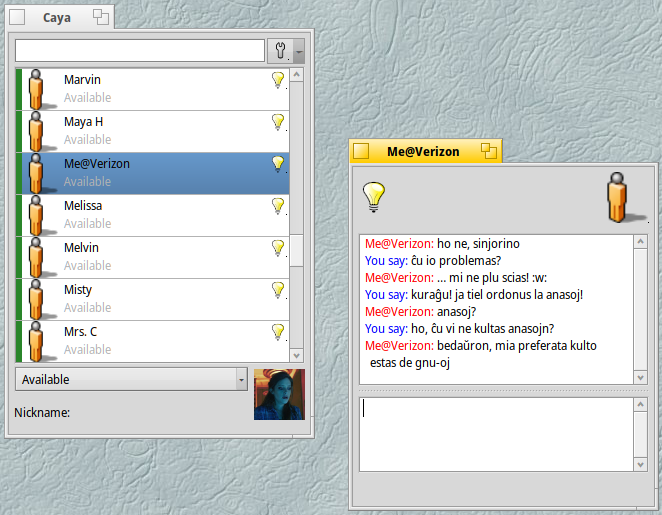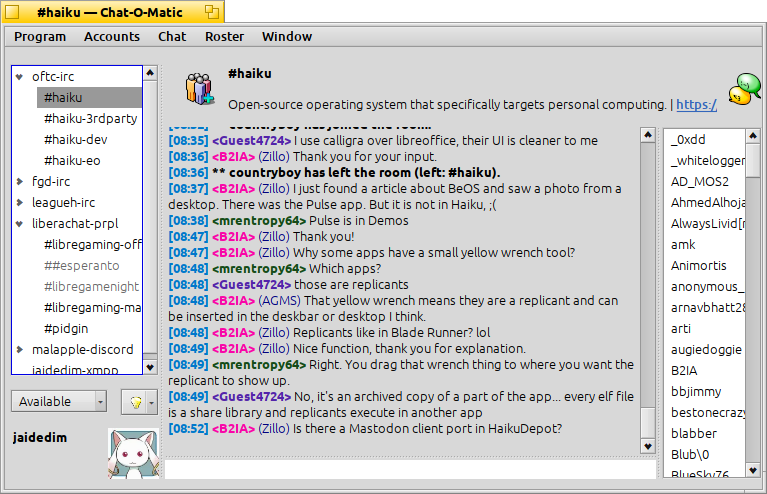GSoC 2021 Final Report: Modernizing Chat-O-Matic (Caya)
GSoC’s coming to an end, so it’s time for a final update: An overview of what I’ve been working on this summer.
Project
My project was to “modernize” and write a libpurple add-on for Caya, a multi-protocol chat program. Ultimately, I hard-forked Caya into Chat-O-Matic at the request of a previous maintainer― with the name being suggested by win8linux. :-)
“Modernization” here means three things: Allowing multiple accounts in use at once, re-orienting the program to support multi-user chats, and giving add-ons some more flexibility.
Work done
To start off, here’s a before-and-after picture. (Aren’t I lucky this is the sorta project where progress can be shown through screenshots?)
… and an obligatory note: You can find sources and all commits on GitHub. Everything between c6c1bb3 and 6e67401 are commits pertaining to this project.
I’ll sum up some of the bigger points I’ve addressed over the summer.
General
“Multiples” were made of a few things― multi-account support, multi-user chats, and multiple protocols per-addon.
With a new focus on rooms, rather than one-on-one chats, the door to a few more features was opened: chat commands, moderation, subjects, room logging, and better notifications.
Management and loading of accounts was also overhauled to be a little more friendly, in that they can now be disabled and re-enabled at a whim, rather than requiring a restart― and they spam with more status notifications, which is always reassuring to see.
UI
The UI has been changed a good bit, mainly to accommodate the new focus on multi-user rooms― most obviously join/create/invite dialogues were added, the room-list became the focus rather than the contacts list, and a user-list is added to each chat.
Several parts of the GUI have been readjusted for multi-account support, like an accounts drop-down menu in particular dialogues or account-selection in the status area (bottom-left corner).
The design’s also been changed to take after Vision. The UI is single-window, an Accounts menu takes place of the Server menu… you can probably see the resemblance.
Other general changes include moderation items, nick/subject changes through the GUI, and receiving of formatted messages (foreground color or font-face).
Add-ons
General changes impacted the add-on messages API― several new messages have been added, and others had to be changed to distinguish between chats and users or for semantic reasons.
The GUI templating system was generalized, expanding how settings dialogues were populated into some other areas. Add-ons can also specify custom pop-up menu items, commands, etc.
But the dust has settled, and at this point, the API is stable: I won’t be making any compatibility-breaking changes in the foreseeable future (only additive ones), and have started better documenting it.
libpurple
libpurple is a chat library used by Pidgin, another multi-protocol chat client.
Writing a libpurple add-on was one of my main goals for GSoC, and there is now a full-featured libpurple add-on included with the program. Most things you’d expect are supported― chat commands, room invitations, contact management, etc. Common Notify and Request UI ops (GUI notifications/dialogues) are supported, as well.
libpurple protocols can be used just like any other, and look the same from the user’s perspective.
IRC
During the last couple weeks, I spent some time writing a native IRC add-on. It supports all of Chat-O-Matic’s features, including auto-join, contacts, and text color/face-formatting.
Funnily enough, this means there are now two protocols that can be used either through libpurple or through native add-ons― XMPP and IRC plugins are included with libpurple, and XMPP and IRC add-ons are included with Chat-O-Matic. Take your pick!
I’d recommend sticking with the native add-ons, as they can take advantage of some of Chat-O-Matic’s features better than libpurple, but if you’re not having luck with one, you could always give the other a try. No harm done. :P
Undone work
A couple things I planned on doing in my proposal and introduction didn’t come to pass, mainly in relation to libpurple plugins. Originally, I planned on removing the native XMPP add-on in favor of libpurple’s built-in― but my perspective here has changed.
When I first set out on this project, I saw libpurple as a main driver for protocol support, but I’m realizing that might not be a good role for it. libpurple plugins just can’t have the integration of native add-ons, nor can they be used on x86 systems (at least for now)― and in some cases they are inadequate (one example being purple-matrix).
My new perspective on the relation between libpurple and native add-ons is this: libpurple is good to use for particularly difficult or niche protocols (like purple-discord), but native add-ons might generally be preferred. libpurple is a back-up and a convenience, not a basket to put every egg into.
That’s my take on it, at least.
Future work
There’s still work to be done on Chat-O-Matic, like file-transfers, replacing the BTextView-based chat buffer with a more modern view, libpurple support for ChatBuddies and more UI ops, etc.
Personally, my next priority is going to be a Matrix add-on, which was one of my primary motivators for this project in the first place. … Though I might take a bit of a break before getting started. :P
Trying Chat-O-Matic
Having dogfooded Chat-O-Matic as my only IRC/XMPP/Discord client for the past couple weeks I think it’s fair to say it’s in a usable state. It should be safe to try, and I sure hope it won’t bite. If you’d like to have a go, you can build it from source.
As far as packages go, I’m hoping to have a recipe committed to HaikuPorts soon
(where it’ll be available as chat_o_matic), but for now you could use the
x86_64 HPKG built for the
v0.0.1 release.
See the README for prerequisites.
Final note
I’ve had fun the past couple of months, and I’ve learned a lot I’d like to apply elsewhere. I had trouble using add-ons with another project before GSoC, for instance… and after working with them so much recently, I don’t think it’ll give me as much trouble. :P
I’ve worked with a couple really nice codebases this summer― mainly Caya’s― and it’s been a good time. Thanks for all the feedback and friendliness, especially from my mentors!
Sorry for the block of text, though, it’s a little much. I guess it didn’t end up being so “quick.”
Cheers!






